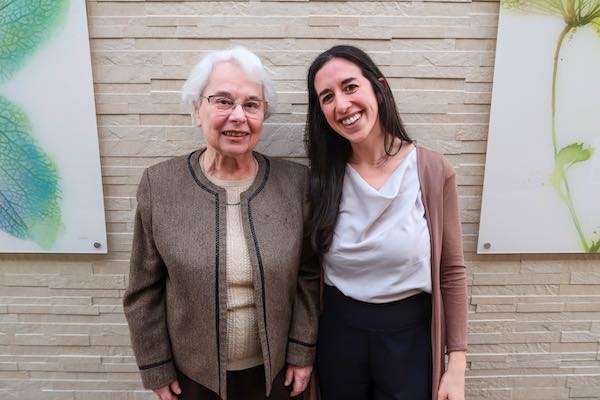Having a Healthy Pregnancy at Age 35-Plus
- Details
- Written by: Joanne Wallenstein
- Category: Health
 Submitted by Dr. Karimah Smith, Obstetrics & Gynecology at White Plains Hospital
Submitted by Dr. Karimah Smith, Obstetrics & Gynecology at White Plains Hospital
The number of women in the U.S. giving birth at age 35 and older has steadily been growing. Between 1990 and 2023, birth rates increased 71% among women ages 35-39, 127% among women ages 40-44 and 127% in women 45 and older, according to the CDC. Researchers cite several reasons for this increase, including changing social expectations and values; prioritizing education and career earlier in life; waiting longer to get married; and improvements in reproductive technologies. No matter the reason, there are several things to keep in mind when considering pregnancy if you are 35 or older.
The Pregnancy Journey
First, as women age, our fertility is reduced – a process that begins in the early 30s. By mid-40s, most women have difficulty conceiving naturally, and the average woman begins menopause at 51.
While there are always inherent risks to getting pregnant, older women may face more complications. These include difficulty in getting pregnant, as well as an increased chance of multiple births due to the body’s releasing more than one egg as it goes through hormonal changes. The risk of multiple births also rises if you are undergoing in vitro fertilization (IVF) treatments – one of the many options for couples having difficulty conceiving.
Once pregnant, your chance of developing gestational diabetes is also more common. Your physician will check you for gestational diabetes, but remaining physically active can be very important. Following as much of your regular workout routine can also keep you feeling calm and comfortable and may help during labor and recovery.
Risk Factors & Recommendations
While women over the age of 35 often have great outcomes and healthy babies, there are some other risk factors to keep in mind. As we age, there is the potential for:
• A higher risk of pregnancy loss, often due to pre-existing medical conditions or the baby’s chromosomal conditions. It is important to talk with your provider about genetic screenings and the optimal time for getting screened
• A greater risk of premature birth
• An increased risk of a baby born much larger or much smaller than average
• A higher chance of a C-section delivery
I recommend the following measures to make your pregnancy and birth as smooth as possible:
• Take prenatal vitamins with folic acid and docosahexaenoic acid (DHA), an omega-3 fatty acid that can be vital for a fetus’ and infant’s brain and eye development
• Keep up with your appointments, as you will be monitored for signs of preeclampsia or gestational diabetes
• After delivery, try to be up and mobile as soon as you can; this helps with your recovery either from vaginal or C-section delivery
Having a baby at any age is one of life’s great joys, but being aware of the risk factors involved – especially if you are 35 or older – is essential to ensuring you are prepared for what is ahead. Your physician is always your greatest resource, so be sure to let us know your plans so we can help you every step of the way.
Learn more about White Plains Hospital's Maternity services.
Dr. Karimah Smith is a board-certified obstetrics and gynecology physician at White Plains Hospital Physician Associates in White Plains. To make an appointment, call 914-328-8444.
Health Matters
The original version of this article was published in Health Matters, a White Plains Hospital publication.
Recreation Department Asks You to Complete Survey on Youth Sports Programs
- Details
- Written by: Joanne Wallenstein
- Category: Health
 The Scarsdale Recreatio Department is asking for your input to a survey on youth sports program. Please find the link to complete the survey below:
The Scarsdale Recreatio Department is asking for your input to a survey on youth sports program. Please find the link to complete the survey below:
Dear Scarsdale Families,
Scarsdale Recreation is conducting a short survey (estimated 5–10 minutes) to gather community input on youth sports programs. It’s been nearly 20 years since our last comprehensive review, and we want to ensure our offerings continue to meet the needs of today’s families.
Your feedback will help us evaluate league structure, coaching models, and the balance between developmental and competitive play, across all ages and sports.
Please take a few minutes to share your perspective. Your input will help shape the future of youth sports in Scarsdale.
Here is the link to the Scarsdale Youth Sports Community Survey.
Thank you,
Scarsdale Recreation Department
Weight Watch
- Details
- Written by: Dr. Angel Rodriguez
- Category: Health
 (The following was submitted by Dr. Angel Rodriguez, Primary Care Physician at White Plains Hospital.)
(The following was submitted by Dr. Angel Rodriguez, Primary Care Physician at White Plains Hospital.)
When the World Health Organization recognized obesity as a global epidemic in 1997, less than 20% of Americans were considered obese, with a body mass index (BMI) greater than or equal to 30.
Less than three decades later, the numbers are staggering. Obesity rates in the United States have doubled to 40% according to a 2021-2023 report by the Centers for Disease Control. As rates continue to rise, it’s predicted more than 250 million Americans will be obese or overweight by 2050.
“Obesity is one of the most common conditions I see in patients,” says Dr. Angel Rodriguez, Medical Director of Primary Care at White Plains Hospital Physician Associates. “Over the past several decades, we’ve seen a shift toward high-calorie diets comprised of processed foods that are full of salt, sugar, fats, and artificial colorings. They are designed to entice people to eat more, but they’re not very healthy and lack nutrients.”
Though Westchester’s obesity rate sits well below the national average at 24% of the population, residents still report overindulging in ultra-processed foods. In the most recent Westchester County Community Health Assessment, 20% of adults self-reported consuming one or more sugary drink daily and 23% said they ate less than one fruit or vegetable daily.
Avoiding processed foods and exercising for at least 150 minutes per week can help achieve a healthy BMI.
Increasingly sedentary lifestyles also contribute to weight gain—a trend that’s been exacerbated in recent years by increased screen time and work-from-home culture. “COVID brought that out more than anything. Now we sit in front of the computer eating and talking,” Dr. Rodriguez says. “I can relate. As with everyone else, I gained weight during the pandemic and am working hard to get back to a healthy weight.”
Shedding excess pounds has a positive impact on heart health. “Carrying extra weight is like carrying a backpack full of rocks,” Dr. Rodriguez says. “Your heart has to work harder and the extra weight causes added stress in the whole body, including on the joints and liver as well.” Obesity is also tied to increased incidence of other chronic conditions, including hypertension, high cholesterol, insulin resistance, and diabetes—all risk factors for heart disease—as well as inflammation and joint pain.
Dr. Rodriguez recommends this commonly prescribed regimen for reaching a healthy BMI:
• Follow a healthy diet and swap those processed foods for fruits, vegetables, whole grains, lean proteins, and healthy fats.
• Aim for at least 150 minutes of exercise per week.
• Eat slower to help with portion control.
• And, drink lots of water — it’s good for you and filling.
Before starting an exercise regimen, patients should visit their primary care physician for a physical—a step Dr. Rodriguez notes is often overlooked. A comprehensive exam confirms the heart is healthy enough for cardio and can identify other factors linked to weight gain, like genetics, hypothyroidism, and in young women, polycystic ovary syndrome. “Most patients who are obese are relatively sedentary,” he notes. “You want to have a sense of what their heart can handle before they go run on a treadmill.”
Physicians can also advise on injectable weight-loss (GLP-1 and GIP receptor agonists) medications for appropriate patients to help with weight loss and lower the risk of heart attack. “You still need to eat right and exercise, but the good thing is that these meds are working for the right patients,” says Dr. Rodriguez.
To combat this growing epidemic, small, sustainable changes to diet and lifestyle can make a significant impact over time. With the right support and  resources, maintaining a healthy weight and reducing heart-disease risk is within reach, Dr. Rodriguez notes.
resources, maintaining a healthy weight and reducing heart-disease risk is within reach, Dr. Rodriguez notes.
Dr. Angel Rodriguez is the Medical Director of Primary Care at White Plains Hospital Physician Associates. To make an appointment with Dr. Rodriguez at WPHPA of Pleasantville, located at 180 Marble Avenue, call 914-849-4100.
Health Matters
The original version of this article was published in Health Matters, a White Plains Hospital publication.
White Plains Hospital’s Team-Based Approach to Multiple Sclerosis Care
- Details
- Written by: Joanne Wallenstein
- Category: Health
 The following interview with Dr. Ute Traugott and Dr. Samantha Epstein, Neurology was submitted by White Plains Hospital.
The following interview with Dr. Ute Traugott and Dr. Samantha Epstein, Neurology was submitted by White Plains Hospital.
Cases of multiple sclerosis (MS), a chronic progressive autoimmune disease that affects the central nervous system, are on the rise in the United States, impacting nearly 1 million people nationwide – with the number of cases nearly quadrupling between 1994 and 2017, according to the National Multiple Sclerosis Society (NMSS).
Improved diagnostic techniques and increased public awareness have contributed to the rise in diagnoses. Risk factors for the condition can include having a first-degree relative with MS or another autoimmune disease as well as vitamin D deficiency and lifestyle factors such as diet, stress, and obesity.
White Plains Hospital is the only healthcare organization in Westchester to have a Multiple Sclerosis Center designated as a Partner in MS Care Center for Comprehensive MS Care by the National Multiple Sclerosis Society. This MS Center offers a variety of services for the diagnosis, treatment and support necessary for living a fulfilling life with MS. Two of its neurologists, Dr. Ute Traugott, Director of White Plains Hospital’s Multiple Sclerosis Center, and Dr. Samantha Epstein, recently sat down to provide information about the Hospital’s approach to the disease.

What are some of the common symptoms of MS, and how is it diagnosed?
Dr. Epstein: In patients with MS, the immune system attacks and damages the central nervous system – the brain, spinal cord, and optic nerves. That damage can result in a variety of symptoms, most notably weakness, numbness and tingling, vision problems, fatigue and difficulties with coordination and balance.
Every MS patient’s journey is different, since symptoms and the disease can vary greatly and are unpredictable, making it a complex condition to manage. There is no single diagnostic test; instead, MS is diagnosed through a combination of clinical history, neurologic examination, ophthalmologic examination, imaging (MRI), blood tests and, if necessary, evaluation of spinal fluid.
What are some of the latest advancements in treating the disease?
Dr. Traugott: All currently available FDA-approved disease modifying therapies (DMTs) for MS are focused on interfering with the migration of activated immune cells from the blood into the central nervous system. This can be achieved by reducing the number of white blood cells through the use of medications that prevent them from multiplying, trapping them in lymph nodes, or by destroying some with the help of monoclonal antibodies. These treatments slow down the progression of the disease and decrease disability.
New therapies that reduce the more widespread inflammation within the central nervous system are expected to become available in the coming year. Several additional medications are currently in clinical trials, one of them focusing on repairing the damage to the myelin, the sheath that forms around the nerves, caused by the disease.
What should a patient look for in an MS center?
Dr. Epstein: Look for neurologists with expertise in diseases affecting the central nervous system who are experienced navigating the complexities of the disease and the ever-growing array of therapies. Additionally, it is important to have access to diagnostic techniques like high-resolution MRI, an infusion center, and the support staff required to help patients through their MS journey.
Dr. Traugott: Certification by the National Multiple Sclerosis Society is very important, as it assures patients that there is a highly-qualified group of specialists forming a treatment team to provide the necessary comprehensive care. The team usually includes rehabilitation specialists, occupational and speech therapists, urologists, radiologists, neuropsychologists, psychiatrists, neurophysiologists and more.
What are some of the other benefits MS patients can access at White Plains Hospital? 
Dr. Traugott: I have more than 30 years of experience in treating MS patients. I am a founding member of the Neuroimmunological Society and have received awards for my contributions to the MS field by the National Multiple Sclerosis Society and by the American Academy of Neurology. Dr. Epstein, who recently joined us, also has a lot of experience in the care of those patients. Our MS-certified RN, Taylor Maloney, provides valuable advice to our patients and can answer many questions they may have. Tammy Schoenfarber, our social worker, is available for counseling newly-diagnosed patients as well as for those who face some challenges later on.
We work closely with Burke Rehabilitation Center and White Plains Hospital’s outpatient physical therapy practices for many of our patients’ rehab needs. We can also refer patients to physicians or other specialists at the Hospital, and to our infusion center.
Learn more about Multiple Sclerosis Services
Dr. Ute Traugott is a specialist in Neurology, Multiple Sclerosis and Neuroimmunology and the Director of White Plains Hospital’s Multiple Sclerosis Center. To make an appointment, call 914-681-1126.
Dr. Samantha Epstein is a board-certified neurologist whose specialties include Multiple Sclerosis and Neuroimmunology. Dr. Epstein sees patients at White Plains Hospital Medical & Wellness in Armonk and WPHPA in Harrison. To make an appointment, call 914-849-5300.
Health Matters
The original version of this article was published in Health Matters, a White Plains Hospital publication.
Key Campaign Highlights 7 Reasons Why Underage Drinking is a Big Deal
- Details
- Written by: Wendy MacMillan
- Category: Health
 Anyone who has had the pleasure of spending time at Scarsdale High School knows what thoughtful, dedicated, and hardworking teenagers we have here in the ‘Dale. It surprises no one when we hear about our teens being recognized for their volunteerism, for their science research projects, for their athletic prowess, or for their incredible artistic abilities. Perhaps, however, it would surprise some in our community to learn that Scarsdale teens’ alcohol consumption is significantly higher than the national average.
Anyone who has had the pleasure of spending time at Scarsdale High School knows what thoughtful, dedicated, and hardworking teenagers we have here in the ‘Dale. It surprises no one when we hear about our teens being recognized for their volunteerism, for their science research projects, for their athletic prowess, or for their incredible artistic abilities. Perhaps, however, it would surprise some in our community to learn that Scarsdale teens’ alcohol consumption is significantly higher than the national average.
In fact, according to Scarsdale Action for Youth (SAY), data from the annual PRIDE Survey reveals that in 2024, 20% of Scarsdale Middle School 8th graders (12 year olds) reported alcohol use, compared to 12% nationally; and 67% of SHS 12th graders reported alcohol use, compared to 41% nationally. The survey also makes clear that here in Scarsdale, the largest jump in teen alcohol consumption is seen in 9th and 10th grades with big increases in use occurring in the springtime around events like graduation and prom.
There are likely a variety of factors that contribute to underage drinking amongst Scarsdale teens: easy access to alcohol in the home, parents who are more complacent, older siblings who might buy alcohol for their younger siblings just to name a few…but whatever the reasons, given the harmful effects alcohol can have on a developing brain and the fact that early alcohol use increases risky behavior, poor grades, and future addiction, SAY encourages parents to do more to discourage their kids from underage drinking.
In their new “KEY” campaign, SAY outlines the pitfalls of early alcohol use and reminds parents that “Teens face pressure, curiosity, and opportunity, often right at home. Talk with them about alcohol and how it hurts their wellbeing. Set clear expectations. And to reduce risk, monitor what’s in your home and lock your liquor. Locking up alcohol isn’t just a physical action. It’s a powerful way to protect your teen from serious harm.”
The annual PRIDE survey further reveals that 40% of middle school students reported that parents either never or seldom discussed problems with drug and alcohol use with them. Another 37% reported that parents discussed the repercussions of alcohol use “only sometimes.” The Key Campaign highlights these 7 reasons why underage drinking is a big deal and encourages parents to talk about these issues with their young teenagers.
It interferes with brain development, especially in areas tied to decision-making and impulse control.
It can increase the risk of mental health issues like anxiety, depression, and suicidal thoughts.
It can lead to risky behavior, including impaired driving, unsafe sex, and violence.
It can damage academic performance, causing poor grades, missed classes, and lower achievement.
It raises the chance of addiction later in life, especially when drinking starts before
age 15.
It affects sleep and mood regulation, which are already fragile during teen years.
It can result in legal trouble that impacts college, jobs, and their future opportunities. Getting caught with a fake ID is a felony and can result in up to a 7-year jail sentence.
Unfortunately, the list doesn’t end here. Learn more here.
Research also shows that parents are the #1 reason why teens refrain from drinking, so parents truly hold the key to whether or not their teenagers drink. In addition to having important discussions with their teens, the Key campaign encourages parents to be proactive about helping teens avoid temptation. With Scarsdale teens admitting that it is easy for them to get their hands on alcohol (namely from a parents’ home bar) and that they are most likely to drink at home or at a friend’s house, SAY recommends the following actions to take:
-Lock up your liquor. SAY suggests these handy locks for cabinets and fridges:
-Count your beers. Keep inventory of your beers and alcoholic beverages.
-Dye clear liquor to prevent it from being watered down.
-Supervise the basement parties at your house and be clear about rules in your house. Remember that Westchester has a social hosting law, which means you are liable if alcohol is served to minors at your house.
For more tips and strategies or to learn more about the Key Campaign check out Scarsdale Action for Youth website here and follow SAY on Facebook, Instagram, or X.com.







